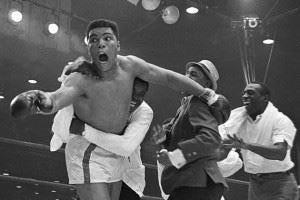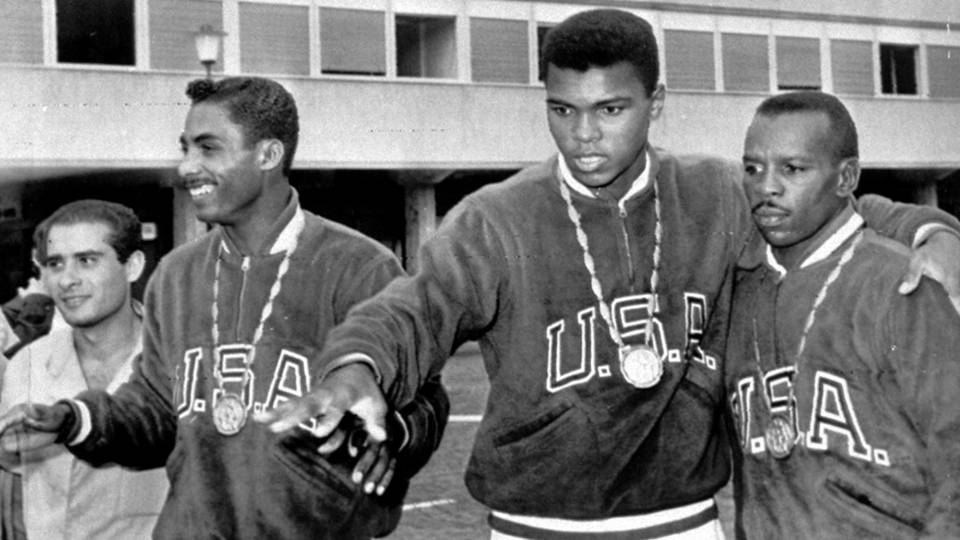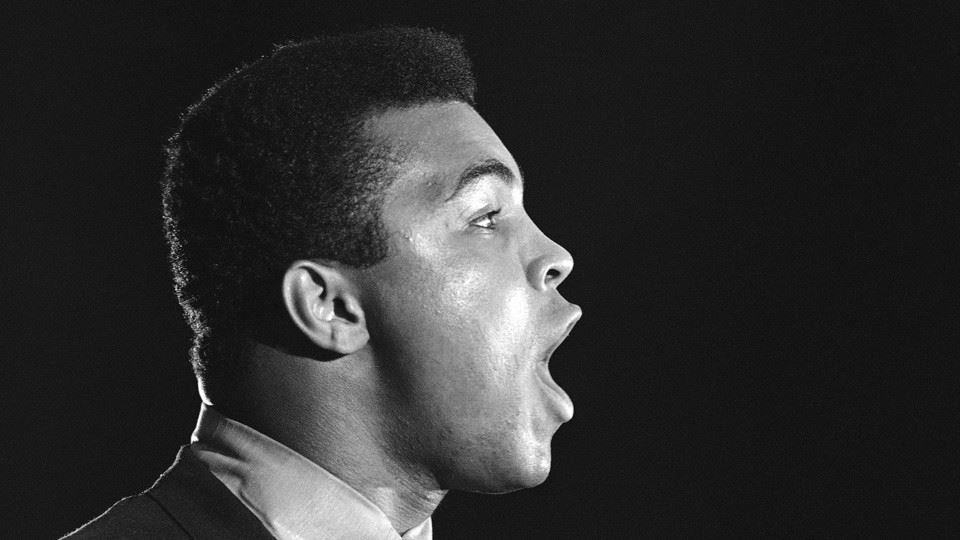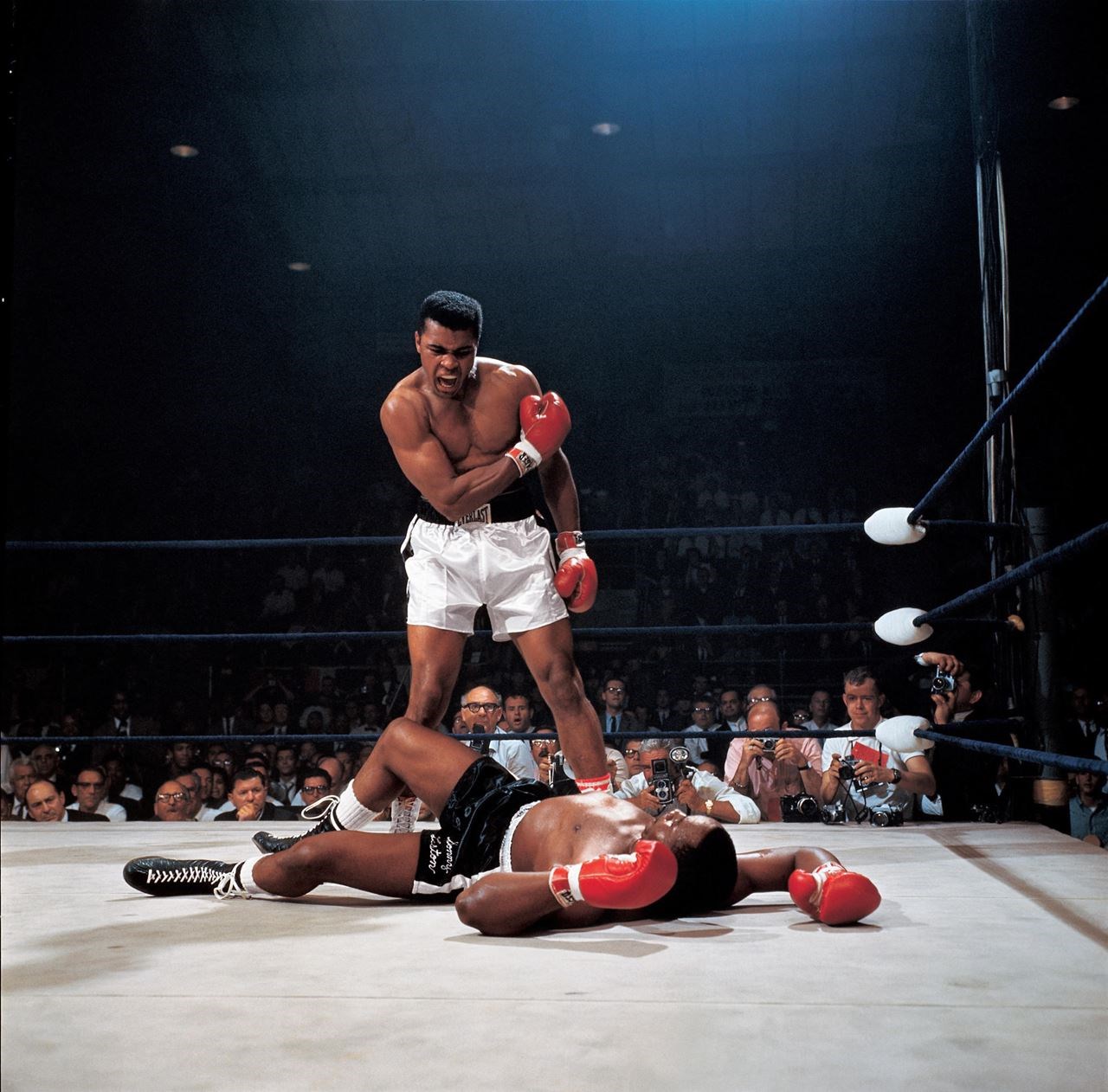 Muhammad Ali Wins Heavyweight Title at 22 in 1964https://www.findingdulcinea.comImagine entering a stadium filled with 10,000 people, all staring at you. You cross over the ropes and enter the ring to meet your opponent. He towers above like a giant, ready to fight. This was the case for young, hotshot boxer Muhammad Ali, for his first Championship game. He would go on to become the heavyweight champion of the world-beating all odds of his time. Cassius Clay, later known as Muhammad Ali, was born in Louisville, Kentucky in 1942, in a predominantly segregated America. Ali grew up in the cruel and unfair world. This harsh environment greatly impacted his future. During his career, Muhammad Ali often referred to himself as “The Greatest”. He truly represented his nickname through his several brave, courageous and compassionate acts, such as speaking out against segregation and protesting the Vietnam War.
Muhammad Ali Wins Heavyweight Title at 22 in 1964https://www.findingdulcinea.comImagine entering a stadium filled with 10,000 people, all staring at you. You cross over the ropes and enter the ring to meet your opponent. He towers above like a giant, ready to fight. This was the case for young, hotshot boxer Muhammad Ali, for his first Championship game. He would go on to become the heavyweight champion of the world-beating all odds of his time. Cassius Clay, later known as Muhammad Ali, was born in Louisville, Kentucky in 1942, in a predominantly segregated America. Ali grew up in the cruel and unfair world. This harsh environment greatly impacted his future. During his career, Muhammad Ali often referred to himself as “The Greatest”. He truly represented his nickname through his several brave, courageous and compassionate acts, such as speaking out against segregation and protesting the Vietnam War.
 Muhammad Ali wins gold at the 1960 Olympics in Romehttps://www.sportingnews.comAt the time when his career was taking off, so was the Civil Rights movement in America. After winning the 1960 Olympics heavyweight boxing, Muhammad Ali returned to his hometown of Louisville, Kentucky. He visited a store in the downtown area, expecting praise for his newly acquired gold medal. Instead of praise, they refused him service and forced him to leave. “I come back to America and can’t even get served at a five and dime store. I went to the bridge, tore the medal off my neck and threw it in the river. That medal didn't mean a thing to me if my black brothers and sisters are treated wrong in a country I was supposed to represent.” (Ali 1960). In times of segregation, he spoke out against the unjust treatment of African Americans. Regardless of who they were, Muhammad Ali expressed love for all of his fellow African Americans. In times of high tension between races, to speak out on something controversial was dangerous. Despite the risk, Muhammad Ali expressed his opinions to the media. He was a popular celebrity, but that did not stop him from taking a stand and speaking against the racial discrimination. This takes an extreme amount of bravery, which is not commonly found in people who support a controversial topic. Many people opposed Muhammad Ali because of his race and beliefs. However, this only strengthened him and made him into an inspiration for the youth to look up to. “Robinson is the white man's hero. But Cassius is the black man's hero. Do you know why? Because the white press wanted him to lose [his heavyweight championship bout]...because he is a Muslim. You notice nobody cares about the religion of other athletes. But their prejudice against Clay blinded them to his ability.” (Durham 5). During segregation in America, African Americans were constantly oppressed. Whenever one would accomplish or attempt to do something, the media would frown down upon them. It would always be them versus the world. Muhammad Ali changed all of this. Muhammad Ali, though a boxer, was compassionate. He stood up for his beliefs in the civil rights movement as he felt the pity of his fellow African Americans due to discriminations.
Muhammad Ali wins gold at the 1960 Olympics in Romehttps://www.sportingnews.comAt the time when his career was taking off, so was the Civil Rights movement in America. After winning the 1960 Olympics heavyweight boxing, Muhammad Ali returned to his hometown of Louisville, Kentucky. He visited a store in the downtown area, expecting praise for his newly acquired gold medal. Instead of praise, they refused him service and forced him to leave. “I come back to America and can’t even get served at a five and dime store. I went to the bridge, tore the medal off my neck and threw it in the river. That medal didn't mean a thing to me if my black brothers and sisters are treated wrong in a country I was supposed to represent.” (Ali 1960). In times of segregation, he spoke out against the unjust treatment of African Americans. Regardless of who they were, Muhammad Ali expressed love for all of his fellow African Americans. In times of high tension between races, to speak out on something controversial was dangerous. Despite the risk, Muhammad Ali expressed his opinions to the media. He was a popular celebrity, but that did not stop him from taking a stand and speaking against the racial discrimination. This takes an extreme amount of bravery, which is not commonly found in people who support a controversial topic. Many people opposed Muhammad Ali because of his race and beliefs. However, this only strengthened him and made him into an inspiration for the youth to look up to. “Robinson is the white man's hero. But Cassius is the black man's hero. Do you know why? Because the white press wanted him to lose [his heavyweight championship bout]...because he is a Muslim. You notice nobody cares about the religion of other athletes. But their prejudice against Clay blinded them to his ability.” (Durham 5). During segregation in America, African Americans were constantly oppressed. Whenever one would accomplish or attempt to do something, the media would frown down upon them. It would always be them versus the world. Muhammad Ali changed all of this. Muhammad Ali, though a boxer, was compassionate. He stood up for his beliefs in the civil rights movement as he felt the pity of his fellow African Americans due to discriminations.
 Muhammad Ali speaking out against Vietnamhttps://www.theatlantic.comAside from the Civil Rights Movement, America had another problem on its hands. Across the world, the conflict was unfolding. The Vietnam War was at its climax during Muhammad's Ali’s boxing career. At this point in the conflict, most everyone was pro-war, unaware of the violence caused by it. Muhammad Ali saw through it all and was one of the first to speak out against it. “My intention in doing is to win a clean fight. But in war, the intention is to kill, kill, kill and continue killing innocent people.” (Ali 1967). Despite being surrounded by pro-war influence, Muhammad Ali refused to go on draft. Due to his recent conversion to Islam, Muhammad Ali declared that it was not tolerable for a Muslim to kill. His new beliefs helped choose the right option for peace rather than war. When he declared that, he received backlash. Everyone from the media to the government was against him, claiming he was a coward and a traitor. Just, because of his refusal, Ali had all his titles stripped from his name, he was no longer allowed to fight and was sentenced to 5 years in jail. At this point, most may have given up. Yet, Muhammad Ali persevered with his choice of peace instead of violence. As tension grew between Muhammad Ali and the rest of the nation, Ali gave more support to his choice. “I will not go 10,000 miles to help murder poor people, simply to continue the domination of white slave masters over the darker people of the earth.” (Ali 1967). This provided more insight into his choice of refusal. He not only did not want to go because of the violence but also because he believed that the only reason for the war was for the country to enslave and abuse more innocent people. This, too caused issues for Ali. However, at the end of a 5-year legal battle, Muhammad Ali had won his case for refusing the draft. At the end of it, all Muhammad Ali exhibited acts of bravery, courage, and compassion during his legal fight. In times of hopelessness, he persevered. He was once again brave to stand up for his beliefs and was compassionate towards the oppressed people of Vietnam.
Muhammad Ali speaking out against Vietnamhttps://www.theatlantic.comAside from the Civil Rights Movement, America had another problem on its hands. Across the world, the conflict was unfolding. The Vietnam War was at its climax during Muhammad's Ali’s boxing career. At this point in the conflict, most everyone was pro-war, unaware of the violence caused by it. Muhammad Ali saw through it all and was one of the first to speak out against it. “My intention in doing is to win a clean fight. But in war, the intention is to kill, kill, kill and continue killing innocent people.” (Ali 1967). Despite being surrounded by pro-war influence, Muhammad Ali refused to go on draft. Due to his recent conversion to Islam, Muhammad Ali declared that it was not tolerable for a Muslim to kill. His new beliefs helped choose the right option for peace rather than war. When he declared that, he received backlash. Everyone from the media to the government was against him, claiming he was a coward and a traitor. Just, because of his refusal, Ali had all his titles stripped from his name, he was no longer allowed to fight and was sentenced to 5 years in jail. At this point, most may have given up. Yet, Muhammad Ali persevered with his choice of peace instead of violence. As tension grew between Muhammad Ali and the rest of the nation, Ali gave more support to his choice. “I will not go 10,000 miles to help murder poor people, simply to continue the domination of white slave masters over the darker people of the earth.” (Ali 1967). This provided more insight into his choice of refusal. He not only did not want to go because of the violence but also because he believed that the only reason for the war was for the country to enslave and abuse more innocent people. This, too caused issues for Ali. However, at the end of a 5-year legal battle, Muhammad Ali had won his case for refusing the draft. At the end of it, all Muhammad Ali exhibited acts of bravery, courage, and compassion during his legal fight. In times of hopelessness, he persevered. He was once again brave to stand up for his beliefs and was compassionate towards the oppressed people of Vietnam.
 Muhammad Ali wins his first championship in 1964https://www.latimes.comMuhammed Ali was a hero as he cared for the oppressed and was brave when standing up for himself and when expressing his beliefs. He spoke out against the tyranny that was segregation. He also made great strides in the anti-war movement in a pro-war country. To accomplish all of this, while being peaceful is a truly an impressive feat. Muhammed Ali floated like a butterfly with his compassion and stung like a bee in his words against discrimination. Muhammed Ali is no longer with us. Yet, it doesn't mean we can't use his teachings. We all can be like Muhammad Ali. All it takes is bravery, courage, and compassion and we to can make the world a better place.
Muhammad Ali wins his first championship in 1964https://www.latimes.comMuhammed Ali was a hero as he cared for the oppressed and was brave when standing up for himself and when expressing his beliefs. He spoke out against the tyranny that was segregation. He also made great strides in the anti-war movement in a pro-war country. To accomplish all of this, while being peaceful is a truly an impressive feat. Muhammed Ali floated like a butterfly with his compassion and stung like a bee in his words against discrimination. Muhammed Ali is no longer with us. Yet, it doesn't mean we can't use his teachings. We all can be like Muhammad Ali. All it takes is bravery, courage, and compassion and we to can make the world a better place.
Works Consulted
Cosentino, Joseph, director. Muhammad Ali - The Whole Story . Muhammad Ali - The Whole Story, Turner Home Ent, 18 Dec. 2001, www.youtube.com/watch?v=EVskzafcP08.
Hauser, Thomas. “Muhammad Ali.” Encyclopedia Britannica , Encyclopedia Britannica , 27 Mar. 2018, www.britannica.com/biography/Muhammad-Ali-boxer.
Meyers, Walter Dean. The Greatest, Muhammed Ali. Louisville: Scholastic Press, 2001
"Muhammad Ali." Contemporary Black Biography, vol. 52, Gale, 2006. Biography In Context, https://link.galegroup.com/apps/doc/K1606003283/BIC?u=powa9245&sid=BIC&xid=f9d0750c. Accessed 27 Mar. 2018.
Page created on 4/18/2018 4:46:55 PM
Last edited 4/21/2018 6:31:03 PM
